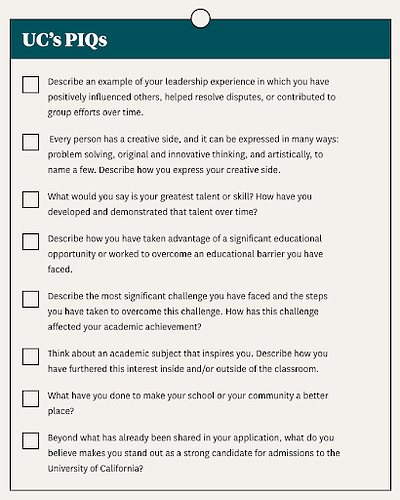Hi everyone — I’m an editor with the San Francisco Chronicle’s California College Guide.
In early September college advisers from around the country gathered in San Jose to soak up insider knowledge at UC’s annual admissions conference.
The Chronicle was there, too.
We learned that for high school students hoping to become a University of California freshman, just 1,400 words could make all the difference.
The UC application offers students the chance to succinctly introduce themselves to the university by answering four out of eight Personal Insight Questions, the all-important “PIQs.”
(Why are we posting here? The Chronicle has partnered with College Confidential to bring the information from our California College Guide to this platform. We’re looking to hear more about how people are searching for colleges in California, and what kinds of information and tools are the most important to you. And we’re hoping we can help answer some questions on topics ranging from “impacted majors” to the cost of college.)
“This is the only opportunity for students to have a conversation with us,” Jeanette Sanders, a senior admissions counselor at UC Irvine, said.
Here are the tips that UC experts say will increase your chance of PIQ success — and the pitfalls to avoid.
When answering PIQs, UC wants you to do this:
- Each response should reveal something different — and new — about you personally. It should be something you haven’t already told them in your application
- Use “I” and “my” statements
- Include your recent experiences that directly correlate with high school, or describe something from the past that is relevant because it dramatically affected you
- Set aside your modesty and talk about your achievements and your hopes
- Make yourself — not your family or friends — the main character
- Get to the point immediately
- Fully answer all parts of each question
- Use a conversational tone
Things to avoid when answering PIQs
- Do not write an essay
- Do not use rhetorical questions
- Do not use famous quotes
- Do not use your precious 1,400 words to provide definitions for PIQ readers
- Do not try to hook the reader with a clever lead-in sentence. Just get to the point
- Do not use flowery language. Keep the thesaurus closed
- Do not use artificial intelligence or the internet to answer for you. Your application could be disqualified
Tips from UC
- Try reading the question aloud and recording your first-draft answer. This might inspire an even better second draft
- To help decide which questions to choose, list the four most important things you want someone to know about you. Use the prompts to talk about these things. The content is more important than the questions you choose
- Ask yourself: Does my answer need more details? What do I want the admissions office to learn about me with this answer? Why am I including this specific information? Is it new — or have I already shared it?
What additional tips do you have for answering the Personal Insight Questions? How are you or your student using these short opportunities to stand out in a crowded application pool? Let us know.
